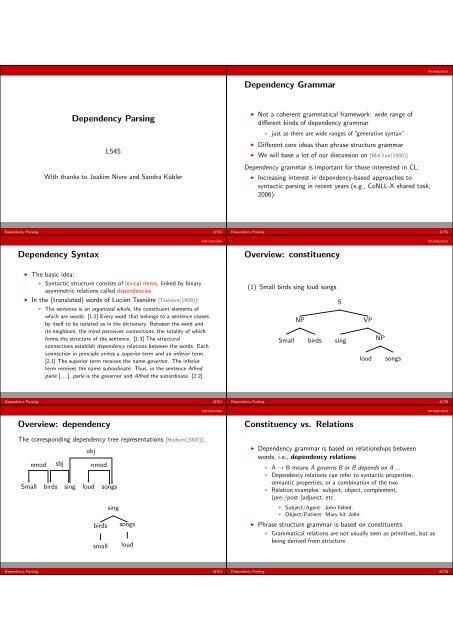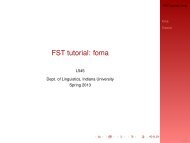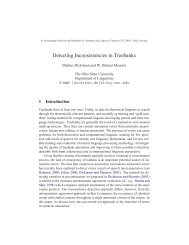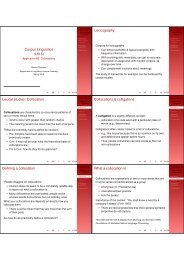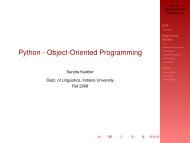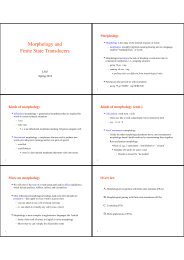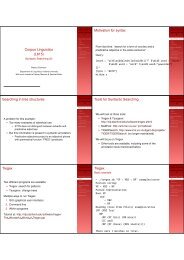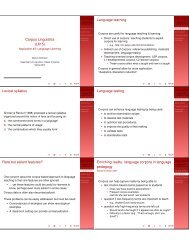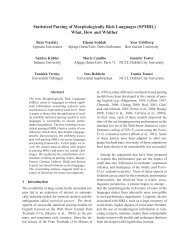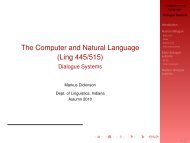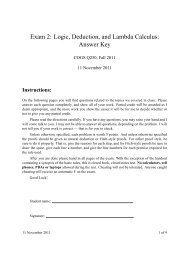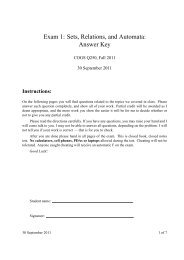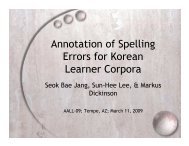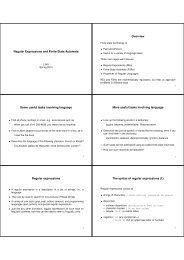Dependency Parsing Dependency Grammar Dependency Syntax ...
Dependency Parsing Dependency Grammar Dependency Syntax ...
Dependency Parsing Dependency Grammar Dependency Syntax ...
- No tags were found...
Create successful ePaper yourself
Turn your PDF publications into a flip-book with our unique Google optimized e-Paper software.
Introduction<strong>Dependency</strong> <strong>Grammar</strong><strong>Dependency</strong> <strong>Parsing</strong>L545With thanks to Joakim Nivre and Sandra Kübler◮ Not a coherent grammatical framework: wide range ofdifferent kinds of dependency grammar◮just as there are wide ranges of ”generative syntax”◮ Different core ideas than phrase structure grammar◮ We will base a lot of our discussion on [Mel’čuk(1988)]<strong>Dependency</strong> grammar is important for those interested in CL:◮ Increasing interest in dependency-based approaches tosyntactic parsing in recent years (e.g., CoNLL-X shared task,2006)<strong>Dependency</strong> <strong>Parsing</strong> 1(70)<strong>Dependency</strong> <strong>Parsing</strong> 2(70)IntroductionIntroduction<strong>Dependency</strong> <strong>Syntax</strong>Overview: constituency◮ The basic idea:◮ Syntactic structure consists of lexical items, linked by binaryasymmetric relations called dependencies.◮ In the (translated) words of Lucien Tesnière [Tesnière(1959)]:◮The sentence is an organized whole, the constituent elements ofwhich are words. [1.2] Every word that belongs to a sentence ceasesby itself to be isolated as in the dictionary. Between the word andits neighbors, the mind perceives connections, the totality of whichforms the structure of the sentence. [1.3] The structuralconnections establish dependency relations between the words. Eachconnection in principle unites a superior term and an inferior term.[2.1] The superior term receives the name governor. The inferiorterm receives the name subordinate. Thus, in the sentence Alfredparle [. . . ], parle is the governor and Alfred the subordinate. [2.2](1) Small birds sing loud songsSNPSmall birds singVPloudNPsongs<strong>Dependency</strong> <strong>Parsing</strong> 3(70)<strong>Dependency</strong> <strong>Parsing</strong> 4(70)IntroductionIntroductionOverview: dependencyConstituency vs. RelationsThe corresponding dependency tree representations [Hudson(2000)]:objnmod sbj nmodSmall birds sing loud songssingbirdssmallsongsloud◮ <strong>Dependency</strong> grammar is based on relationships betweenwords, i.e., dependency relations◮ A → B means A governs B or B depends on A ...◮ <strong>Dependency</strong> relations can refer to syntactic properties,semantic properties, or a combination of the two◮ Relation examples: subject, object, complement,(pre-/post-)adjunct, etc.◮◮Subject/Agent: John fished.Object/Patient: Mary hit John.◮ Phrase structure grammar is based on constituents◮ Grammatical relations are not usually seen as primitives, but asbeing derived from structure<strong>Dependency</strong> <strong>Parsing</strong> 5(70)<strong>Dependency</strong> <strong>Parsing</strong> 6(70)
Some Theoretical IssuesIntroductionSome Clear CasesIntroduction◮ <strong>Dependency</strong> structure sufficient as well as necessary?◮ Mono-stratal or multi-stratal syntactic representations?◮ What is the nature of lexical elements (nodes)?◮◮◮Morphemes?Word forms?Multi-word units?◮ What is the nature of dependency types (arc labels)?◮◮Grammatical functions?Semantic roles?◮ What are the criteria for identifying heads and dependents?◮ What are the formal properties of dependency structures?nmodConstruction Head DependentExocentric Verb Subject (sbj)Verb Object (obj)Endocentric Verb Adverbial (vmod)Noun Attribute (nmod)sbjvmodEconomic news suddenly affected financial markets .objnmod<strong>Dependency</strong> <strong>Parsing</strong> 13(70)<strong>Dependency</strong> <strong>Parsing</strong> 14(70)Some Tricky CasesIntroduction<strong>Dependency</strong> GraphsIntroduction◮ Complex verb groups (auxiliary ↔ main verb)◮ Subordinate clauses (complementizer ↔ verb)◮ Coordination (coordinator ↔ conjuncts)◮ Prepositional phrases (preposition ↔ nominal)◮ Punctuationsbjvg ?sbar ?obj sbj vc pc ? co ? cj ?I can see that they rely on this and that .?p◮ A dependency structure can be defined as a directed graph G,consisting of◮ a set V of nodes,◮ a set E of arcs (edges),◮ a linear precedence order < on V .◮ Labeled graphs:◮ Nodes in V are labeled with word forms (and annotation).◮ Arcs in E are labeled with dependency types.◮ Notational conventions (i, j ∈ V ):◮ i → j ≡ (i, j) ∈ E◮ i → ∗ j ≡ i = j ∨ ∃k : i → k, k → ∗ j<strong>Dependency</strong> <strong>Parsing</strong> 15(70)<strong>Dependency</strong> <strong>Parsing</strong> 16(70)Formal Conditions on <strong>Dependency</strong> GraphsIntroductionConnectedness, Acyclicity and Single-HeadIntroduction◮ G is (weakly) connected:◮ For every node i there is a node j such that i → j or j → i.◮ G is acyclic:◮ If i → j then not j → ∗ i.◮ G obeys the single-head constraint:◮ If i → j, then not k → j, for any k ≠ i.◮ G is projective:◮ If i → j then i → ∗ k, for any k such that i
Projectivity◮ Most theoretical frameworks do not assume projectivity.◮ Non-projective structures are needed to account for◮ long-distance dependencies,◮ free word order.pcpvgsbjobjnmod nmod nmodIntroductionWhere we’re going◮ <strong>Dependency</strong> parsing:◮ Input: Sentence x = w1 , . . . w n◮ Output: <strong>Dependency</strong> graph G◮ Focus today:◮ Computational methods for dependency parsing◮ Resources for dependency parsing (parsers, treebanks)IntroductionWhat did economic news have little effect on ?<strong>Dependency</strong> <strong>Parsing</strong> 19(70)<strong>Dependency</strong> <strong>Parsing</strong> 20(70)<strong>Parsing</strong> Methods<strong>Parsing</strong> MethodsDeterministic <strong>Parsing</strong><strong>Parsing</strong> Methods◮ Three main traditions:◮ Deterministic parsing (specifically: Transition-based parsing)◮ Dynamic programming (specifically: Graph-based parsing)◮ Constraint satisfaction (not covered today)◮ Special issue:◮ Non-projective dependency parsing◮ Basic idea:◮ Derive a single syntactic representation (dependency graph)through a deterministic sequence of elementary parsing actions◮ Sometimes combined with backtracking or repair◮ Motivation:◮◮◮Psycholinguistic modelingEfficiencySimplicity<strong>Dependency</strong> <strong>Parsing</strong> 21(70)<strong>Dependency</strong> <strong>Parsing</strong> 22(70)Covington’s Incremental Algorithm<strong>Parsing</strong> MethodsShift-Reduce Type Algorithms<strong>Parsing</strong> Methods◮ Deterministic incremental parsing in O(n 2 ) time by trying tolink each new word to each preceding one [Covington(2001)]:PARSE(x = (w 1 , . . . , w n ))1 for i = 1 up to n2 for j = i − 1 down to 13 LINK(w i , w j )⎧⎨ E ← E ∪ (i, j)LINK(w i , w j ) = E ← E ∪ (j, i)⎩E ← Eif w j is a dependent of w iif w i is a dependent of w jotherwise◮ Different conditions, such as Single-Head and Projectivity, canbe incorporated into the LINK operation.Transition-based parsing◮ Data structures:◮ Stack [. . . , wi ] S of partially processed tokens◮ Queue [wj , . . .] Q of remaining input tokens◮ <strong>Parsing</strong> actions built from atomic actions:◮ Adding arcs (wi → w j , w i ← w j )◮ Stack and queue operations◮ Left-to-right parsing in O(n) time◮ Restricted to projective dependency graphs<strong>Dependency</strong> <strong>Parsing</strong> 23(70)<strong>Dependency</strong> <strong>Parsing</strong> 24(70)
<strong>Parsing</strong> Methods<strong>Parsing</strong> MethodsYamada’s AlgorithmNivre’s Algorithm◮ Three parsing actions:◮ Four parsing actions:Shift[. . .] S [w i , . . .] Q[. . . , w i ] S [. . .] QShift[. . .] S [w i , . . .] Q[. . . , w i ] S [. . .] QLeftRight[. . . , w i , w j ] S [. . .] Q[. . . , w i ] S [. . .] Q w i → w j[. . . , w i , w j ] S [. . .] Q[. . . , w j ] S [. . .] Q w i ← w j◮ Algorithm variants:◮ Originally developed for Japanese (strictly head-final) with onlythe Shift and Right actions [Kudo and Matsumoto(2002)]◮ Adapted for English (with mixed headedness) by adding theLeft action [Yamada and Matsumoto(2003)]◮ Multiple passes over the input give time complexity O(n 2 )Reduce[. . . , w i ] S [. . .] Q ∃w k : w k → w i[. . .] S [. . .] QLeft-Arc r[. . . , w i ] S [w j , . . .] Q ¬∃w k : w k → w i[. . .] S [w j , . . .] Q w ir← w jRight-Arc r[. . . , w i ] S [w j , . . .] Q ¬∃w k : w k → w j[. . . , w i , w j ] S [. . .] Q w ir→ w j◮ Characteristics:◮ Integrated labeled dependency parsing◮ Arc-eager processing of right-dependents◮ Single pass over the input gives time complexity O(n)<strong>Dependency</strong> <strong>Parsing</strong> 25(70)<strong>Dependency</strong> <strong>Parsing</strong> 26(70)<strong>Parsing</strong> Methods<strong>Parsing</strong> MethodsExampleClassifier-Based <strong>Parsing</strong>pred[root] S [Economic] S [news] S [had] S [little] S [effect] S [on] S [financial] Sobjsbjnmod nmod nmodShift Left-Arc nmod Shift Left-Arc sbj Right-Arc pred ShiftLeft-Arc nmod Right-Arc obj Right-Arc nmod Shift Left-Arc nmodRight-Arc pc Reduce Reduce Reduce Reduce Right-Arc pppcnmo◮ Data-driven deterministic parsing:◮ Deterministic parsing requires an oracle.◮ An oracle can be approximated by a classifier.◮ A classifier can be trained using treebank data.◮ Learning methods:◮ Support vector machines (SVM)[Kudo and Matsumoto(2002), Yamada and Matsumoto(2003),Isozaki et al.(2004)Isozaki, Kazawa and Hirao,Cheng et al.(2004)Cheng, Asahara and Matsumoto,Nivre et al.(2006)Nivre, Hall, Nilsson, Eryiğit and Marinov]◮ Memory-based learning (MBL)[Nivre et al.(2004)Nivre, Hall and Nilsson, Nivre and Scholz(2004)]◮ Maximum entropy modeling (MaxEnt)[Cheng et al.(2005)Cheng, Asahara and Matsumoto]<strong>Dependency</strong> <strong>Parsing</strong> 27(70)<strong>Dependency</strong> <strong>Parsing</strong> 28(70)<strong>Parsing</strong> Methods<strong>Parsing</strong> MethodsFeature ModelsComparing Algorithms◮ Learning problem:◮ Approximate a function from parser states, represented byfeature vectors to parser actions, given a training set of goldstandard derivations.◮ Typical features:◮ Tokens:◮ Target tokens◮ Linear context (neighbors in S and Q)◮ Structural context (parents, children, siblings in G)◮ Attributes:◮ Word form (and lemma)◮ Part-of-speech (and morpho-syntactic features)◮ <strong>Dependency</strong> type (if labeled)◮ Distance (between target tokens)◮ <strong>Parsing</strong> algorithm:◮ Nivre’s algorithm gives higher accuracy than Yamada’salgorithm for parsing the Chinese CKIP treebank[Cheng et al.(2004)Cheng, Asahara and Matsumoto].◮ Learning algorithm:◮ SVM gives higher accuracy than MaxEnt for parsing theChinese CKIP treebank[Cheng et al.(2004)Cheng, Asahara and Matsumoto].◮ SVM gives higher accuracy than MBL with lexicalized featuremodels for three languages[Hall et al.(2006)Hall, Nivre and Nilsson]:◮ Chinese (Penn)◮ English (Penn)◮ Swedish (Talbanken)<strong>Dependency</strong> <strong>Parsing</strong> 29(70)<strong>Dependency</strong> <strong>Parsing</strong> 30(70)
MIRA<strong>Parsing</strong> MethodsResults by McDonald et al. (2005a, 2005b)<strong>Parsing</strong> MethodsMIRA weight update:min ||w (i+1) − w (i) || so thatscore(sent t , deps t ) − score(sent t , deps ′ ) ≥ L(deps t , deps ′ )∀deps ′ ∈ dt(sent t )◮ Unlabeled accuracy per word (W) and per sentence (S)English CzechParser W S W Sk-best MIRA Eisner 90.9 37.5 83.3 31.3best MIRA CLE 90.2 33.2 84.1 32.2factored MIRA CLE 90.2 32.2 84.4 32.3◮ L(deps, deps ′ ): loss function◮ dt(sent): possible dependency parses for sentence◮ New development (EACL 2006):◮ Scores of dependencies are not independent any more◮ Better results<strong>Dependency</strong> <strong>Parsing</strong> 43(70)Evaluation on English◮ Evaluation:◮ Penn Treebank (WSJ) converted to dependency graphs◮ Unlabeled accuracy per word (W) and per sentence (S)◮ Deterministic classifier-based parsers[Yamada and Matsumoto(2003),Isozaki et al.(2004)Isozaki, Kazawa and Hirao]◮ Spanning tree parsers with online training[McDonald et al.(2005a)McDonald, Crammer and Pereira,McDonald and Pereira(2006)]◮ Collins and Charniak parsers with same conversionParser W SCharniak 92.2 45.2Collins 91.7 43.3McDonald and Pereira 91.5 42.1Isozaki et al. 91.4 40.7McDonald et al. 91.0 37.5Yamada and Matsumoto 90.4 38.4<strong>Parsing</strong> Methods<strong>Dependency</strong> <strong>Parsing</strong> 44(70)<strong>Parsing</strong> Methods<strong>Parsing</strong> Methods◮ Three main traditions:◮ Deterministic parsing (specifically: Transition-based parsing)◮ Dynamic programming (specifically: Graph-based parsing)◮ Deterministic parsing◮ Special issue:◮ Non-projective dependency parsing<strong>Dependency</strong> <strong>Parsing</strong> 45(70)<strong>Dependency</strong> <strong>Parsing</strong> 46(70)Non-Projective <strong>Dependency</strong> <strong>Parsing</strong><strong>Parsing</strong> MethodsTwo Main Approaches<strong>Parsing</strong> Methods◮ Many parsing algorithms are restricted to projectivedependency graphs.◮ Is this a problem?◮ Statistics from CoNLL-X Shared Task [Buchholz and Marsi(2006)]◮ NPD = Non-projective dependencies◮ NPS = Non-projective sentencesLanguage %NPD %NPSDutch 5.4 36.4German 2.3 27.8Czech 1.9 23.2Slovene 1.9 22.2Portuguese 1.3 18.9Danish 1.0 15.6◮ Algorithms for non-projective dependency parsing:◮ Constraint satisfaction methods[Tapanainen and Järvinen(1997), Duchier and Debusmann(2001),Foth et al.(2004)Foth, Daum and Menzel]◮ McDonald’s spanning tree algorithm[McDonald et al.(2005b)McDonald, Pereira, Ribarov and Hajič]◮ Covington’s algorithm [Nivre(2006)]◮ Post-processing of projective dependency graphs:◮◮◮Pseudo-projective parsing [Nivre and Nilsson(2005)]Corrective modeling [Hall and Novák(2005)]Approximate non-projective parsing[McDonald and Pereira(2006)]<strong>Dependency</strong> <strong>Parsing</strong> 47(70)<strong>Dependency</strong> <strong>Parsing</strong> 48(70)
Non-Projective <strong>Parsing</strong> Algorithms<strong>Parsing</strong> MethodsPost-Processing<strong>Parsing</strong> Methods◮ Complexity considerations:◮ Projective (Proj)◮ Non-projective (NonP)Problem/Algorithm Proj NonPComplete grammar parsing P NP hard[Gaifman(1965), Neuhaus and Bröker(1997)]Deterministic parsing O(n) O(n 2 )[Nivre(2003), Covington(2001)]First order spanning tree O(n 3 ) O(n 2 )[McDonald et al.(2005b)McDonald, Pereira, Ribarov and Hajič]Nth order spanning tree (N > 1) P NP hard[McDonald and Pereira(2006)]◮ Two-step approach:1. Derive the best projective approximation of the correct(possibly) non-projective dependency graph.2. Improve the approximation by replacing projective arcs by(possibly) non-projective arcs.◮ Rationale:◮ Most“naturally occurring” dependency graphs are primarilyprojective, with only a few non-projective arcs.◮ Approaches:◮◮◮Pseudo-projective parsing [Nivre and Nilsson(2005)]Corrective modeling [Hall and Novák(2005)]Approximate non-projective parsing[McDonald and Pereira(2006)]<strong>Dependency</strong> <strong>Parsing</strong> 49(70)Pseudo-Projective <strong>Parsing</strong>◮ Projectivize training data:◮ Projective head nearest permissible ancestor of real head◮ Arc label extended with dependency type of real headPredAuxP↑SbAtrAuxPAuxKAuxProot Z nich je jen jedna na kvalitu .SbAuxZAdv(out-of) (them) (is) (only) (one) (to) (quality)<strong>Parsing</strong> Methods<strong>Dependency</strong> <strong>Parsing</strong> 51(70)<strong>Dependency</strong> <strong>Parsing</strong> 50(70)Evaluation on Czech<strong>Parsing</strong> Methods◮ Evaluation:◮ Prague <strong>Dependency</strong> Treebank (PDT)◮ Unlabeled accuracy per word (W) and per sentence (S)◮ Non-projective spanning tree parsing[McDonald et al.(2005b)McDonald, Pereira, Ribarov and Hajič]◮ Corrective modeling on top of the Charniak parser[Hall and Novák(2005)]◮ Approximate non-projective parsing on top of a second-orderprojective spanning tree parser [McDonald and Pereira(2006)]◮ Pseudo-projective parsing on top of a deterministicclassifier-based parser[Nilsson et al.(2006)Nilsson, Nivre and Hall]Parser W SMcDonald and Pereira 85.2 35.9Hall and Novák 85.1 —Nilsson et al. 84.6 37.7McDonald et al. 84.4 32.3Charniak 84.4 –<strong>Dependency</strong> <strong>Parsing</strong> 52(70)Multilingual <strong>Parsing</strong><strong>Parsing</strong> MethodsPractical IssuesPractical Issues◮ CoNLL-X Shared Task: 12 (13) languages◮ Organizers: Sabine Buchholz, Erwin Marsi, YuvalKrymolowski, Amit Dubey◮ Main evaluation metric: Labeled accuracy per word◮ Top scores ranging from 91.65 (Japanese) to 65.68 (Turkish)◮ Top systems (over all languages):◮ Approximate second-order non-projective spanning tree parsingwith online learning (MIRA)[McDonald et al.(2006)McDonald, Lerman and Pereira]◮ Labeled deterministic pseudo-projective parsing with supportvector machines[Nivre et al.(2006)Nivre, Hall, Nilsson, Eryiğit and Marinov]◮ Where to get the software?◮ <strong>Dependency</strong> parsers◮ Conversion programs for constituent-based treebanks◮ Where to get the data?◮ <strong>Dependency</strong> treebanks◮ Treebanks that can be converted into dependencyrepresentation<strong>Dependency</strong> <strong>Parsing</strong> 53(70)<strong>Dependency</strong> <strong>Parsing</strong> 54(70)
ParsersPractical IssuesTrainable ParsersPractical Issues◮ Trainable parsers◮ Parsers with manually written grammars◮ Concentrate on freely available parsers◮ Jason Eisner’s probabilistic dependency parser◮ Based on bilexical grammar◮ Contact Jason Eisner: jason@cs.jhu.edu◮ Written in LISP◮ Ryan McDonald’s MSTParser◮ Based on the algorithms of[McDonald et al.(2005a)McDonald, Crammer and Pereira,McDonald et al.(2005b)McDonald, Pereira, Ribarov and Hajič]◮ URL:http://www.seas.upenn.edu/~ryantm/software/MSTParser/◮ Written in JAVA<strong>Dependency</strong> <strong>Parsing</strong> 55(70)<strong>Dependency</strong> <strong>Parsing</strong> 56(70)Trainable Parsers (2)Practical IssuesParsers for Specific LanguagesPractical Issues◮ Joakim Nivre’s MaltParser◮ Inductive dependency parser with memory-based learning andSVMs◮ URL:http://w3.msi.vxu.se/~nivre/research/MaltParser.html◮ Executable versions are available for Solaris, Linux, Windows,and MacOS (open source version planned for fall 2006)◮ Dekang Lin’s Minipar◮ Principle-based parser◮ <strong>Grammar</strong> for English◮ URL: http://www.cs.ualberta.ca/~lindek/minipar.htm◮ Executable versions for Linux, Solaris, and Windows◮ Wolfgang Menzel’s CDG Parser:◮ Weighted constraint dependency parser◮ <strong>Grammar</strong> for German, (English under construction)◮ Online demo:http://nats-www.informatik.uni-hamburg.de/Papa/ParserDemo◮ Download:http://nats-www.informatik.uni-hamburg.de/download<strong>Dependency</strong> <strong>Parsing</strong> 57(70)<strong>Dependency</strong> <strong>Parsing</strong> 58(70)Parsers for Specific Languages (2)Practical IssuesTreebanksPractical Issues◮ Taku Kudo’s CaboCha◮ Based on algorithms of [Kudo and Matsumoto(2002)], usesSVMs◮ URL: http://www.chasen.org/~taku/software/cabocha/◮ Web page in Japanese◮ Gerold Schneider’s Pro3Gres◮ Probability-based dependency parser◮ <strong>Grammar</strong> for English◮ URL: http://www.ifi.unizh.ch/CL/gschneid/parser/◮ Written in PROLOG◮ Daniel Sleator’s & Davy Temperley’s Link <strong>Grammar</strong> Parser◮ Undirected links between words◮ <strong>Grammar</strong> for English◮ URL: http://www.link.cs.cmu.edu/link/◮ Genuine dependency treebanks◮ Treebanks for which conversions to dependencies exist◮ See also CoNLL-X Shared TaskURL: http://nextens.uvt.nl/~conll/◮ Conversion strategy from constituents to dependencies<strong>Dependency</strong> <strong>Parsing</strong> 59(70)<strong>Dependency</strong> <strong>Parsing</strong> 60(70)
<strong>Dependency</strong> TreebanksPractical Issues<strong>Dependency</strong> Treebanks (2)Practical Issues◮ Arabic: Prague Arabic <strong>Dependency</strong> Treebank◮ Czech: Prague <strong>Dependency</strong> Treebank◮ Danish: Danish <strong>Dependency</strong> Treebank◮ Portuguese: Bosque: Floresta sintá(c)tica◮ Slovene: Slovene <strong>Dependency</strong> Treebank◮ Turkish: METU-Sabanci Turkish Treebank◮ Prague Arabic <strong>Dependency</strong> Treebank◮ ca. 100 000 words◮ Available from LDC, license fee(CoNLL-X shared task data, catalogue number LDC2006E01)◮ URL: http://ufal.mff.cuni.cz/padt/◮ Prague <strong>Dependency</strong> Treebank◮ 1.5 million words◮ 3 layers of annotation: morphological, syntactical,tectogrammatical◮ Available from LDC, license fee(CoNLL-X shared task data, catalogue number LDC2006E02)◮ URL: http://ufal.mff.cuni.cz/pdt2.0/<strong>Dependency</strong> <strong>Parsing</strong> 61(70)<strong>Dependency</strong> <strong>Parsing</strong> 62(70)<strong>Dependency</strong> Treebanks (3)Practical Issues<strong>Dependency</strong> Treebanks (4)Practical Issues◮ Danish <strong>Dependency</strong> Treebank◮ ca. 5 500 trees◮ Annotation based on Discontinuous <strong>Grammar</strong> [Kromann(2005)]◮ Freely downloadable◮ URL: http://www.id.cbs.dk/~mtk/treebank/◮ Bosque, Floresta sintá(c)tica◮ ca. 10 000 trees◮ Freely downloadable◮ URL:http://acdc.linguateca.pt/treebank/info_floresta_English.html◮ Slovene <strong>Dependency</strong> Treebank◮ ca. 30 000 words◮ Freely downloadable◮ URL: http://nl.ijs.si/sdt/◮ METU-Sabanci Turkish Treebank◮ ca. 7 000 trees◮ Freely available, license agreement◮ URL: http://www.ii.metu.edu.tr/~corpus/treebank.html<strong>Dependency</strong> <strong>Parsing</strong> 63(70)<strong>Dependency</strong> <strong>Parsing</strong> 64(70)Constituent TreebanksPractical IssuesConstituent Treebanks (2)Practical Issues◮ English: Penn Treebank◮ Bulgarian: BulTreebank◮ Chinese: Penn Chinese Treebank, Sinica Treebank◮ Dutch: Alpino Treebank for Dutch◮ German: TIGER/NEGRA, TüBa-D/Z◮ Japanese: TüBa-J/S◮ Spanish: Cast3LB◮ Swedish: Talbanken05◮ Penn Treebank◮ ca. 1 million words◮ Available from LDC, license fee◮ URL: http://www.cis.upenn.edu/~treebank/home.html◮ <strong>Dependency</strong> conversion rules, available from e.g. [Collins(1999)]◮ For conversion with arc labels: Penn2Malt:http://w3.msi.vxu.se/~nivre/research/Penn2Malt.html◮ BulTreebank◮ ca. 14 000 sentences◮ URL: http://www.bultreebank.org/◮ <strong>Dependency</strong> version available from Kiril Simov(kivs@bultreebank.org)<strong>Dependency</strong> <strong>Parsing</strong> 65(70)<strong>Dependency</strong> <strong>Parsing</strong> 66(70)
Constituent Treebanks (3)Practical IssuesConstituent Treebanks (4)Practical Issues◮ Penn Chinese Treebank◮ ca. 4 000 sentences◮ Available from LDC, license fee◮ URL: http://www.cis.upenn.edu/~chinese/ctb.html◮ For conversion with arc labels: Penn2Malt:http://w3.msi.vxu.se/~nivre/research/Penn2Malt.html◮ Sinica Treebank◮ ca. 61 000 sentences◮ Available Academia Sinica, license fee◮ URL:http://godel.iis.sinica.edu.tw/CKIP/engversion/treebank.htm◮ <strong>Dependency</strong> version available from Academia Sinica◮ Alpino Treebank for Dutch◮ ca. 150 000 words◮ Freely downloadable◮ URL: http://www.let.rug.nl/vannoord/trees/◮ <strong>Dependency</strong> version downloadable athttp://nextens.uvt.nl/~conll/free_data.html◮ TIGER/NEGRA◮ ca. 50 000/20 000 sentences◮ Freely available, license agreement◮ TIGER URL:http://www.ims.uni-stuttgart.de/projekte/TIGER/TIGERCorpus/NEGRA URL:http://www.coli.uni-saarland.de/projects/sfb378/negra-corpus/◮ <strong>Dependency</strong> version of TIGER is included in release<strong>Dependency</strong> <strong>Parsing</strong> 67(70)<strong>Dependency</strong> <strong>Parsing</strong> 68(70)Constituent Treebanks (5)Practical IssuesConstituent Treebanks (6)Practical Issues◮ TüBa-D/Z◮ ca. 22 000 sentences◮ Freely available, license agreement◮ URL: http://www.sfs.uni-tuebingen.de/en_tuebadz.shtml◮ <strong>Dependency</strong> version available from SfS Tübingen◮ TüBa-J/S◮ Dialog data◮ ca. 18 000 sentences◮ Freely available, license agreement◮ <strong>Dependency</strong> version available from SfS Tübingen◮ URL: http://www.sfs.uni-tuebingen.de/en_tuebajs.shtml(under construction)◮ Cast3LB◮ ca. 18 000 sentences◮ URL: http://www.dlsi.ua.es/projectes/3lb/index_en.html◮ <strong>Dependency</strong> version available from Toni Martí (amarti@ub.edu)◮ Talbanken05◮ ca. 300 000 words◮ Freely downloadable◮ URL:http://w3.msi.vxu.se/~nivre/research/Talbanken05.html◮ <strong>Dependency</strong> version also available<strong>Dependency</strong> <strong>Parsing</strong> 69(70)◮ Buchholz, Sabine and Erwin Marsi (2006). CoNLL-X Shared Task on Multilingual<strong>Dependency</strong> <strong>Parsing</strong>.In Proceedings of the Tenth Conference on Computational Natural LanguageLearning.◮ Cheng, Yuchang, Masayuki Asahara and Yuji Matsumoto (2004). Determinstic<strong>Dependency</strong> Structure Analyzer for Chinese.In Proceedings of the First International Joint Conference on Natural LanguageProcessing (IJCNLP). pp. 500–508.◮ Cheng, Yuchang, Masayuki Asahara and Yuji Matsumoto (2005). MachineLearning-Based <strong>Dependency</strong> Analyzer for Chinese.In Proceedings of International Conference on Chinese Computing (ICCC). pp. ?–?◮ Chu, Y. J. and T. J. Liu (1965). On the Shortest Arborescence of a DirectedGraph.Science Sinica 14, 1396–1400.◮ Collins, Michael (1999). Head-Driven Statistical Models for Natural Language<strong>Parsing</strong>.Ph.D. thesis, University of Pennsylvania.◮ Covington, Michael A. (2001). A Fundamental Algorithm for <strong>Dependency</strong> <strong>Parsing</strong>.In Proceedings of the 39th Annual ACM Southeast Conference. pp. 95–102.References<strong>Dependency</strong> <strong>Parsing</strong> 70(70)◮ Debusmann, Ralph, Denys Duchier and Geert-Jan M. Kruijff (2004). Extensible<strong>Dependency</strong> <strong>Grammar</strong>: A New Methodology.In Proceedings of the Workshop on Recent Advances in <strong>Dependency</strong> <strong>Grammar</strong>. pp.78–85.◮ Dubey, Amit (2005). What to Do when Lexicalization Fails: <strong>Parsing</strong> German withSuffix Analysis and Smoothing.In Proceedings of the 43rd Annual Meeting of the Association for ComputationalLinguistics. Ann Arbor, MI.◮ Duchier, Denys (1999). Axiomatizing <strong>Dependency</strong> <strong>Parsing</strong> Using Set Constraints.In Proceedings of the Sixth Meeting on Mathematics of Language. pp. 115–126.◮ Duchier, Denys (2003). Configuration of Labeled Trees under LexicalizedConstraints and Principles.Research on Language and Computation 1, 307–336.◮ Duchier, Denys and Ralph Debusmann (2001). Topological <strong>Dependency</strong> Trees: AConstraint-based Account of Linear Precedence.In Proceedings of the 39th Annual Meeting of the Association for ComputationalLinguistics (ACL). pp. 180–187.◮ Edmonds, J. (1967). Optimum Branchings.Journal of Research of the National Bureau of Standards 71B, 233–240.References<strong>Dependency</strong> <strong>Parsing</strong> 70(70)<strong>Dependency</strong> <strong>Parsing</strong> 70(70)
◮ Eisner, Jason M. (1996a). An empirical comparison of probability models fordependency grammar.Tech. Rep. IRCS-96-11, Institute for Research in Cognitive Science, University ofPennsylvania.◮ Eisner, Jason M. (1996b). Three new probabilistic models for dependency parsing:An exploration.In Proceedings of the 16th International Conference on Computational Linguistics(COLING). pp. 340–345.◮ Eisner, Jason M. (2000). Bilexical grammars and their cubic-time parsingalgorithms.In Harry Bunt and Anton Nijholt (eds.), Advances in Probabilistic and Other<strong>Parsing</strong> Technologies, Kluwer, pp. 29–62.◮ Foth, Kilian, Michael Daum and Wolfgang Menzel (2004). A Broad-CoverageParser for German Based on Defeasible Constraints.In Proceedings of KONVENS 2004. pp. 45–52.◮ Foth, Kilian, Ingo Schröder and Wolfgang Menzel (2000). A Transformation-basedparsing technique with anytime properties.In Proceedings of the Sixth International Workshop on <strong>Parsing</strong> Technologies(IWPT). pp. 89–100.◮ Gaifman, Haim (1965). <strong>Dependency</strong> systems and phrase-structure systems.ReferencesInformation and Control 8, 304–337.◮ Hall, Johan, Joakim Nivre and Jens Nilsson (2006). Discriminative Classifiers forDeterministic <strong>Dependency</strong> <strong>Parsing</strong>.In Proceedings of COLING-ACL.◮ Hall, Keith and Vaclav Novák (2005). Corrective modeling for non-projectivedependency parsing.In Proceedings of the 9th International Workshop on <strong>Parsing</strong> Technologies(IWPT). pp. 42–52.◮ Harper, Mary P. and R. A. Helzerman (1995). Extensions to constraint dependencyparsing for spoken language processing.Computer Speech and Language 9, 187–234.◮ Hays, David G. (1964). <strong>Dependency</strong> Theory: A Formalism and Some Observations.Language 40, 511–525.◮ Hellwig, Peter (1986). <strong>Dependency</strong> Unification <strong>Grammar</strong>.In Proceedings of the 11th International Conference on Computational Linguistics(COLING). pp. 195–198.◮ Hellwig, Peter (2003). <strong>Dependency</strong> Unification <strong>Grammar</strong>.In Vilmos Agel, Ludwig M. Eichinger, Hans-Werner Eroms, Peter Hellwig,Hans Jürgen Heringer and Hening Lobin (eds.), <strong>Dependency</strong> and Valency, Walterde Gruyter, pp. 593–635.References<strong>Dependency</strong> <strong>Parsing</strong> 70(70)◮ Hudson, Richard A. (1984). Word <strong>Grammar</strong>.Blackwell.◮ Hudson, Richard A. (1990). English Word <strong>Grammar</strong>.Blackwell.References◮ Hudson, Richard A. (2000). <strong>Dependency</strong> <strong>Grammar</strong> Course Notes.http://www.cs.bham.ac.uk/research/conferences/esslli/notes/hudson.\html.◮ Isozaki, Hideki, Hideto Kazawa and Tsutomu Hirao (2004). A Deterministic Word<strong>Dependency</strong> Analyzer Enhanced with Preference Learning.In Proceedings of the 20th International Conference on Computational Linguistics(COLING). pp. 275–281.◮ Järvinen, Timo and Pasi Tapanainen (1998). Towards an Implementable<strong>Dependency</strong> <strong>Grammar</strong>.In Sylvain Kahane and Alain Polguère (eds.), Proceedings of the Workshop onProcessing of <strong>Dependency</strong>-Based <strong>Grammar</strong>s. pp. 1–10.◮ Karlsson, Fred (1990). Constraint grammar as a framework for parsing runningtext.In Hans Karlgren (ed.), Papers presented to the 13th International Conference onComputational Linguistics (COLING). pp. 168–173.◮ Karlsson, Fred, Atro Voutilainen, Juha Heikkilä and Arto Anttila (eds.) (1995).Constraint <strong>Grammar</strong>: A language-independent system for parsing unrestricted text.<strong>Dependency</strong> <strong>Parsing</strong> 70(70)Mouton de Gruyter.◮ Kromann, Matthias Trautner (2005). Discontinuous <strong>Grammar</strong>: A<strong>Dependency</strong>-Based Model of Human <strong>Parsing</strong> and Language Learning.Doctoral Dissertation, Copenhagen Business School.◮ Kübler, Sandra, Erhard W. Hinrichs and Wolfgang Maier (2006). Is it Really thatDifficult to Parse German?In Proceedings of the 2006 Conference on Empirical Methods in Natural LanguageProcessing, EMNLP 2006. Sydney, Australia.◮ Kudo, Taku and Yuji Matsumoto (2002). Japanese <strong>Dependency</strong> Analysis UsingCascaded Chunking.In Proceedings of the Sixth Workshop on Computational Language Learning(CoNLL). pp. 63–69.◮ Lin, Dekang (1995). A <strong>Dependency</strong>-Based Method for Evaluating Broad-CoverageParsers.In Proceedings of IJCAI-95. pp. 1420–1425.◮ Lin, Dekang (1998). A <strong>Dependency</strong>-Based Method for Evaluating Broad-CoverageParsers.Natural Language Engineering 4, 97–114.◮ Lombardo, Vincenzio and Leonardo Lesmo (1996). An Earley-type Recognizer for<strong>Dependency</strong> <strong>Grammar</strong>.References<strong>Dependency</strong> <strong>Parsing</strong> 70(70)In Proceedings of the 16th International Conference on Computational Linguistics(COLING). pp. 723–728.◮ Maruyama, Hiroshi (1990). Structural Disambiguation with ConstraintPropagation.In Proceedings of the 28th Meeting of the Association for ComputationalLinguistics (ACL). pp. 31–38.◮ McDonald, Ryan, Koby Crammer and Fernando Pereira (2005a). OnlineLarge-Margin Training of <strong>Dependency</strong> Parsers.In Proceedings of the 43rd Annual Meeting of the Association for ComputationalLinguistics (ACL). pp. 91–98.◮ McDonald, Ryan, Kevin Lerman and Fernando Pereira (2006). Multilingual<strong>Dependency</strong> Analysis with a Two-Stage Discriminative Parser.In Proceedings of the Tenth Conference on Computational Natural LanguageLearning (CoNLL).◮ McDonald, Ryan and Fernando Pereira (2006). Online Learning of Approximate<strong>Dependency</strong> <strong>Parsing</strong> Algorithms.In Proceedings of the 11th Conference of the European Chapter of the Associationfor Computational Linguistics (EACL). pp. 81–88.◮ McDonald, Ryan, Fernando Pereira, Kiril Ribarov and Jan Hajič (2005b).Non-Projective <strong>Dependency</strong> <strong>Parsing</strong> using Spanning Tree Algorithms.References<strong>Dependency</strong> <strong>Parsing</strong> 70(70)In Proceedings of the Human Language Technology Conference and the Conferenceon Empirical Methods in Natural Language Processing (HLT/EMNLP). pp.523–530.◮ Mel’čuk, Igor (1988). <strong>Dependency</strong> <strong>Syntax</strong>: Theory and Practice.State University of New York Press.◮ Menzel, Wolfgang and Ingo Schröder (1998). Decision Procedures for <strong>Dependency</strong><strong>Parsing</strong> Using Graded Constraints.In Sylvain Kahane and Alain Polguère (eds.), Proceedings of the Workshop onProcessing of <strong>Dependency</strong>-Based <strong>Grammar</strong>s. pp. 78–87.◮ Neuhaus, Peter and Norbert Bröker (1997). The Complexity of Recognition ofLinguistically Adequate <strong>Dependency</strong> <strong>Grammar</strong>s.In Proceedings of the 35th Annual Meeting of the Association for ComputationalLinguistics (ACL) and the 8th Conference of the European Chapter of theAssociation for Computational Linguistics (EACL). pp. 337–343.◮ Nilsson, Jens, Joakim Nivre and Johan Hall (2006). Graph Transformations inData-Driven <strong>Dependency</strong> <strong>Parsing</strong>.In Proceedings of COLING-ACL.◮ Nivre, Joakim (2003). An Efficient Algorithm for Projective <strong>Dependency</strong> <strong>Parsing</strong>.In Gertjan Van Noord (ed.), Proceedings of the 8th International Workshop on<strong>Parsing</strong> Technologies (IWPT). pp. 149–160.References<strong>Dependency</strong> <strong>Parsing</strong> 70(70)<strong>Dependency</strong> <strong>Parsing</strong> 70(70)
◮ Nivre, Joakim (2006). Constraints on Non-Projective <strong>Dependency</strong> Graphs.In Proceedings of the 11th Conference of the European Chapter of the Associationfor Computational Linguistics (EACL). pp. 73–80.◮ Nivre, Joakim, Johan Hall and Jens Nilsson (2004). Memory-Based <strong>Dependency</strong><strong>Parsing</strong>.In Hwee Tou Ng and Ellen Riloff (eds.), Proceedings of the 8th Conference onComputational Natural Language Learning (CoNLL). pp. 49–56.◮ Nivre, Joakim, Johan Hall, Jens Nilsson, Gülsen Eryiğit and Svetoslav Marinov(2006). Labeled Pseudo-Projective <strong>Dependency</strong> <strong>Parsing</strong> with Support VectorMachines.In Proceedings of the Tenth Conference on Computational Natural LanguageLearning (CoNLL).◮ Nivre, Joakim and Jens Nilsson (2005). Pseudo-Projective <strong>Dependency</strong> <strong>Parsing</strong>.In Proceedings of the 43rd Annual Meeting of the Association for ComputationalLinguistics (ACL). pp. 99–106.◮ Nivre, Joakim and Mario Scholz (2004). Deterministic <strong>Dependency</strong> <strong>Parsing</strong> ofEnglish Text.In Proceedings of the 20th International Conference on Computational Linguistics(COLING). pp. 64–70.◮ Schröder, Ingo (2002). Natural Language <strong>Parsing</strong> with Graded Constraints.ReferencesPh.D. thesis, Hamburg University.◮ Sgall, Petr, Eva Hajičová and Jarmila Panevová (1986). The Meaning of theSentence in Its Pragmatic Aspects.Reidel.◮ Sleator, Daniel and Davy Temperley (1991). <strong>Parsing</strong> English with a Link <strong>Grammar</strong>.Tech. Rep. CMU-CS-91-196, Carnegie Mellon University, Computer Science.◮ Tapanainen, Pasi and Timo Järvinen (1997). A non-projective dependency parser.In Proceedings of the 5th Conference on Applied Natural Language Processing. pp.64–71.◮ Tesnière, Lucien (1959). Éléments de syntaxe structurale.Editions Klincksieck.◮ Yamada, Hiroyasu and Yuji Matsumoto (2003). Statistical <strong>Dependency</strong> Analysiswith Support Vector Machines.In Gertjan Van Noord (ed.), Proceedings of the 8th International Workshop on<strong>Parsing</strong> Technologies (IWPT). pp. 195–206.◮ Zwicky, A. M. (1985). Heads.Journal of Linguistics 21, 1–29.References<strong>Dependency</strong> <strong>Parsing</strong> 70(70)<strong>Dependency</strong> <strong>Parsing</strong> 70(70)


